We have much more to do and your continued support is needed now more than ever.
The Tongue River Railroad’s Failed Public Process
* To my readers. Don’t worry about the pessimistic nature of this post. We will still beat the Tongue River Railroad and the Otter Creek coal mine, with or without a fair public process.
Last week, during a three-day meeting in Lame Deer, Montana, hosted by the Surface Transportation Board (STB) concerning the proposed Tongue River Railroad, I came to the unsettling conclusion that the public process is broken. A system, ostensibly meant to gather the public’s input in order to make good policy decisions, ignores the most important questions: questions of right and wrong, of profit at the expense of people, of justice. Bring those questions up in a meeting and watch people squirm in their seats.
But those are the questions that define the fight over the proposed Tongue River coal train. It’s simple.
Consultation in Lame Deer
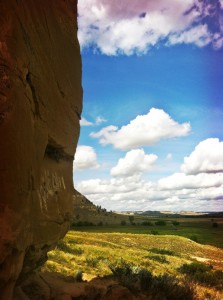
To say that southeastern Montana is rich in cultural and historic sites is an understatement. You can’t walk a foot without seeing a place recorded in the oral and written histories of dozens of Tribes. Representatives from the Northern Cheyenne, Oglala Lakota Sioux, Yankton Sioux, Rosebud Sioux, Crow Creek Sioux, Cheyenne River Sioux, Standing Rock, Spirit Lake and Crow were in attendance.Tribal Historic Preservation Officers asked many good questions of the STB, but let me summarize for you.
Q: Does it matter that almost 100% of the directly impacted citizens of southeastern Montana do not want the Tongue River Railroad built? Answer: We are just at the beginning of the process.
Q: Does it matter that digging up the coal will only benefit a few at the expense of the many? Answer: We are just at the beginning of the process.
Q: Does it matter that this coal will exacerbate climate change, destroy aquifers and cultural sites forever and degrade water and air quality? Answer: We are just at the beginning of the process.
Real answers to these questions will never be answered because the Surface Transportation Board, their third-party contractors and the coal companies are indifferent, at best, to the moral questions of the Tongue River Railroad. The methodology used to measure impacts and mitigation has no room for questions of right and wrong. That is irrelevant to the process.
What the Surface Transportation Board should be doing
I think most citizens accept that our government is supposed to protect individuals from the unreasonable actions of others, especially those with more money, resources, and power. The government must level the playing field. This is to ensure that the interests of the powerful do not trample on the rights, property and lives of the citizens. The government must act as the neutral broker that regulates both the relationship between the individual and the corporation and most importantly, the application of power. It should not act as the agent of industry.
I know, kind of naïve right? But that is standard that our government should be held to, both elected and non-elected representatives, from Senators to Surface Transportation Board staff, and we should demand that they live up to their responsibilities.
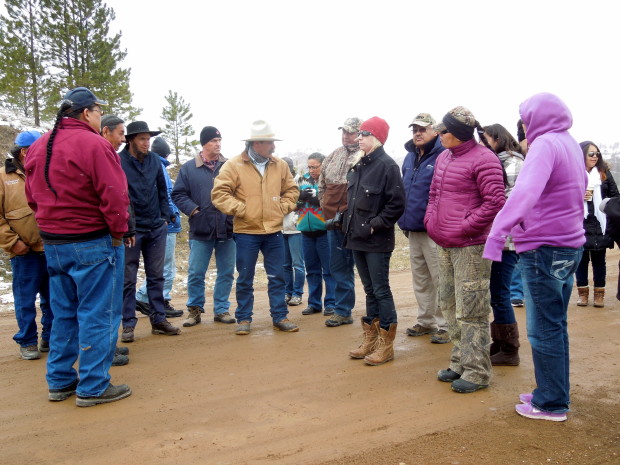
What about the No-Action Alternative? (i.e. The “coal train to Asia” doesn’t get built option)
All of us who attended the meeting heard the staff of the Surface Transportation Board say numerous times, “the alternative that receives a permit.” Wait a minute, someone said, but there is an “alternative” that is the “No Action” alternative that the STB is required to analyze and consider…right? They quickly backtracked, “Oh yes, there is the no action alternative.” Huh, funny, cause you never really mention that alternative as being a viable option.
BNSF and Tongue River Railroad representatives did not disappoint. They, as usual, sat quiet in a corner of the room checking their phones occasionally but otherwise seemed completely uninterested in the proceedings, besides the short little, “we are excited to be working together” pep talk from BNSF’s Public Affairs guy that is.
They never tell the gathered community, landowners and THPO officers why we should support their coal train. Like Vanessa Braided Hair said in her essay, Why the Otter Creek Coal Mine Will Never be Built, they are confident in our government’s disinterest in questions of right or wrong and the ability of the process to deliver them a permit.
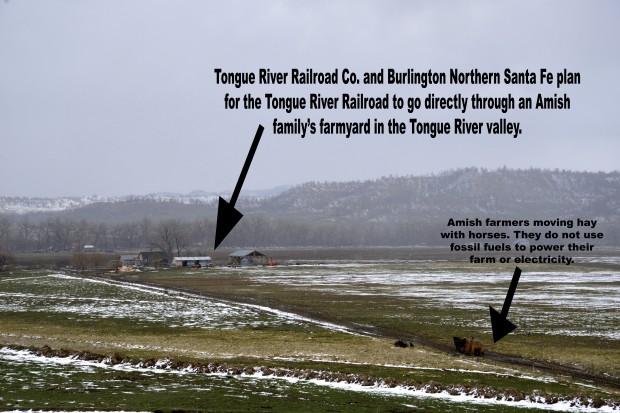
The situation reminds me of a quote by the Cat in Alice in Wonderland, “In that direction,” the Cat said, waving its right paw round, “lives a Hatter: and in that direction,” waving the other paw, “lives the March Hare. Visit either you like: they’re both mad.”
The process doesn’t have a memory, but we do (i.e. The Tongue River Railroad Co. has been bad news for over 30 years)
There is no room in the Surface Transportation Board process for memory. The tribal citizens and ranchers who have been fighting this coal train for over 30 years do remember though. They remember a lot. Just ask them.
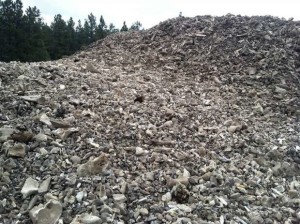
As Jeannie Alderson, a Tongue River rancher said at a recent public hearing,
“The coal companies always tell you what they are going to bring, but they never tell you what they will take away.”
Hundreds of generations of Native Americans have been protecting this land and this is the second generation of ranchers that are fighting this coal train. If I was a betting person, I know which side I’d put my money on.
Here’s something that the Surface Transportation Board staff should consider if they haven’t already. People in Montana have spent decades of their lives fighting this ill-conceived railroad. A railroad that was a bad idea when they first proposed it and is a bad idea now. They have sacrificed their health, time with their friends and family and experienced increased stress worrying that their livelihoods, history, culture and environment will be damaged irreversibly.
And yet, the STB is asking them to participate in another decade long process because Arch Coal’s stocks are in the tank and they need to look like they are expanding for their investors. Tribes and landowners are being asked to participate in the same process that has never worked for them or treated them as equal to the railroad.
If you are opposed to the project entirely, it is interpreted as a refusal to participate in their process. To them, it is irrational and so they trivialize those who criticize the process or say no from outside the power structure.
If the public process worked, this proposal would have been dead and buried long ago.
The process asks the wrong questions of the wrong people (i.e. the people of southeastern Montana are the real experts)
We are told over and over that the process will lead to the best decision for everyone, the public and the coal companies. One big happy family. How sweet.
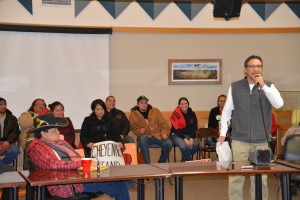
I will be the first to admit that the Surface Transportation Board staff and the experts they have hired know some things. In fact, they know a lot and they also seem like very nice people. People who, on some level, probably know that what is happening is wrong. But their personal views on this matter are irrelevant to what they are paid to produce.
How the experts report what they develop for the EIS will use neither common sense nor the experiences of the people who have lived in the valleys their whole life and whose ancestors lived there as well. A non-rancher doesn’t understand why and how cattle are moved. A non-Cheyenne doesn’t understand why the Greenleaf area is important.
We are told through the process that the experts know best. Without anyone actually saying so, the citizen is eliminated as a participant. We are there to be managed, to be dealt with, another problem that needs to be solved, possibly consulted, but ultimately ignored.
The questions that we need to answer (i.e. Is this right?)
They refuse to ask the question, is it right, is it moral, is it ethical for a private corporation to seize Montanan’s private property, destroy sacred cultural sites of the tribal nations, exacerbate climate change, damage important water resources for wildlife, crop production and livestock, wildlife habitat and air quality?
Not only do they refuse to ask the question, they refuse to admit the question is worth asking. The public process doesn’t allow for moral balance, experiential knowledge, common sense, memory or a social view of the world. Instead, we watch as these important human values wither away.
What is encouraged to flourish is competitiveness, amorality and an extreme aggressiveness when questioned or criticized. Above all, what is encouraged is a growth of an undisciplined corporate self-interest.
What Voice Do We Have?
The people of southeastern Montana, those most directly impacted, say no. No, we don’t want the Tongue River Railroad, the Otter Creek coal mine or your process.
Surface Transportation Board staff tell us it isn’t your decision; that we need to trust the process. A process without memory or morality.
The people ask, whose decision is it? They tell us, it is the decision of three unelected political appointees in Washington D.C. who have never been to the Tongue River Valley. They have never ranched. They have never felt the way the land in southeastern Montana digs in to your soul. They have never experienced the epic beauty of the Tongue River and Otter Creek Valleys.
But, they tell us, don’t worry. We’ll relay your concerns to them and they will be reflected in a 2,000 page Environmental Impact Statement.
That makes all of us out here sleep better at night.
For more background on the Tongue River railroad, please see my series on the Tongue River railroad public hearings at blog.nwf.org/bonogofsky.





















